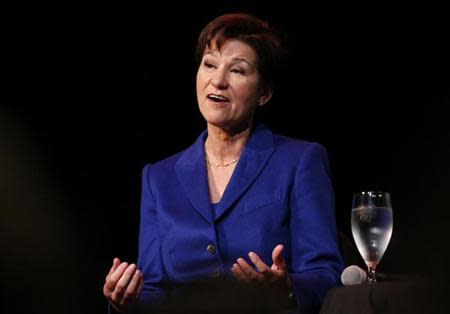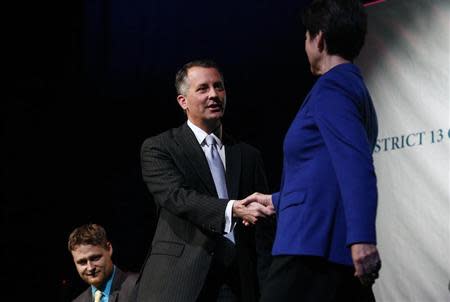Analysis: In Florida, early test of Obamacare's potency in 2014 elections
By John Whitesides INDIAN ROCKS BEACH, Florida (Reuters) - The November midterm elections are more than eight months away, but a battle for an open congressional seat in Florida has become a high-stakes test of a crucial question for the fall: how the Republican assault on President Barack Obama's healthcare overhaul will play at the polls. The race to succeed the late Republican Bill Young in a March 11 special election will not dramatically alter the balance of power in Congress, where Democrats face an uphill battle in November to gain the 17 seats they need to reclaim a majority in the U.S. House of Representatives. Even so, both parties and their big-money backers see the race on the Sunshine State's Gulf Coast between Republican David Jolly and Democrat Alex Sink as a harbinger of the November 4 elections - a test of voter enthusiasm for campaign themes, ad messages and fundraising appeals. That is why voters in the St. Petersburg area have been bombarded in recent weeks by more than $5 million worth of television and radio ads, mailings and automated calls from the candidates and interest groups attacking or defending the healthcare law popularly known as Obamacare. Such spending is extraordinary for a special congressional contest in which the winner will have to run again in November, when the entire 435-seat House will be up for election. A victory by Sink, 65, a former chief financial officer for the state who narrowly lost a bid for Florida governor in 2010, could help reassure nervous Democrats that they will be able to neutralize Republican attacks on Obamacare this fall. Jolly, 41, is a former aide to Young who has been a lobbyist for the past seven years. A win for him in the politically divided district, which Obama narrowly carried in the 2012 presidential election, would be a morale boost for Republicans and signal that their targeting of Obamacare is resonating with voters. "We're the testing ground this year," said Susan MacManus, a political science professor at the University of South Florida in Tampa. "Both sides are watching very closely to see how their messages play with voters." With approval ratings for Obama and his healthcare law below 50 percent nationwide, Jolly and Republicans have tied Sink to the president and reminded voters of her support for Obamacare, a program designed to help millions of uninsured and underinsured Americans get private health coverage. Republicans say the program is too costly, kills jobs and robs many Americans of healthcare choices. Those arguments have been a constant theme in Republican ads against Sink. Jolly, who favors repealing the law, also has questioned Sink's commitment to the district, which she moved into last year from neighboring Hillsborough County. Sink lost to Republican Rick Scott by 1 percentage point in the race for governor in 2010, and Jolly has cast her as an ambitious politician with little interest in Pinellas County. "Pinellas needs someone to look out for our interests, not President Obama's," Jolly says in one campaign video. Another ad from the National Republican Congressional Committee features images of Sink, Obama and House Democratic leader Nancy Pelosi. "Alex Sink's loyalty is to them, not Florida," the narrator says. "Why else would she continue to support Obamacare?" 'NOT A BILL YOUNG REPUBLICAN' Sink has countered by attacking Jolly's work as a lobbyist in Washington and linking him to the conservative Tea Party movement, labeling him an extremist who would threaten Social Security spending. That argument typically plays well in a state that is one of the United States' retirement havens. Sink's strategy reflects a tactic Democrats have signaled they will employ in the fall: emphasize the value of Obamacare and other social programs, and remind voters of Republican divisions between compromise-resistant Tea Party conservatives and the party's more moderate establishment. Jolly calls himself a "Bill Young Republican," invoking the name of the respected moderate who represented the area in Congress for 43 years until his death last year. Sink suggests his views are more in line with Tea Party candidates who she says are far right of America's political mainstream. Sink, a former banker, also brushed off the idea she is new to the area and says she has done business there for decades. During a visit to a local retirement center, she told residents about working to open the first bank branch at the center. "I'm no stranger to Pinellas County, I've been working here for 25 years," she said in an interview in her spartan headquarters in Clearwater. "I can relate to the issues of seniors, protecting Social Security and Medicare." She has criticized Jolly for working as a lobbyist in Washington, including work he did for a client who favored privatizing Social Security. That issue could be key in next month's election, in which analysts say nearly half of the voters are likely to be at or near retirement age. Jolly says he does not support privatization. "She has completely fabricated this," he said of Sink, acknowledging that the ads against him have been "effective but wrong." "They spent a million dollars calling me a Washington lobbyist, and they went out and polled and realized they had wasted a million dollars calling me a lobbyist. So now she is playing the extremist card," Jolly said. GROUPS SPENDING MILLIONS Outside groups have rushed in to help both sides, spending $5.4 million so far. More than $3.4 million of that has been spent on Jolly's behalf, according to figures compiled by the Center for Responsive Politics. The National Republican Congressional Committee has led the spending for Jolly with nearly $1.6 million. Other backers include groups such as the U.S. Chamber of Commerce, the National Rifle Association and American Crossroads, the group led by former George W. Bush aide Karl Rove. The Democratic Congressional Campaign Committee has led the charge for Sink, spending nearly $1 million on her behalf. The result has been a wave of campaign ads and mailings that has dismayed many residents. "This local election has just been taken over by outside forces," said Kathy Krohn, a Clearwater geologist. "I hope people still turn out to vote." Jolly acknowledged feeling guilty about the ad blitz while meeting with voters this week in Indian Rocks Beach near St. Petersburg. "You've seen the commercials. So I'll start by saying I'm David Jolly, and I apologize for one more message." 'WE CAN'T GO BACK' Sink has fought back against Jolly's Obamacare ads by saying she backed the initial effort to broaden access to healthcare and that any problems with the law should be fixed, rather than used to justify killing the entire law. "We can't go back to where we were. It's not perfect, so let's fix it," Sink said of the law through which more than 3 million Americans so far have gotten health coverage. Jolly says he would replace Obamacare with measures that would preserve popular parts of the law, such as those preventing people with pre-existing medical conditions from being denied coverage and allowing children up to age 26 to stay on their parents' health plans. A recent poll by the Tampa Bay Times newspaper found more than two-thirds of each candidates' supporters said Obamacare was an important factor in determining their support. "Sink is a very smart woman, but I'm saddened that she wants Obamacare. It's ruined our economy," said Barbara Koyutis, a real estate agent in Seminole. "She is just doing what the Democrats want her to do." But Bettye Strickland of Largo, a retired state employee who favors Sink, said Obamacare has too many benefits to repeal it. "She wants to fix what's wrong with it, not destroy it, and that seems like a smarter approach," Strickland said, adding that "I just tune all of the (campaign) ads out. You have to." (Editing by David Lindsey and Jonathan Oatis)


